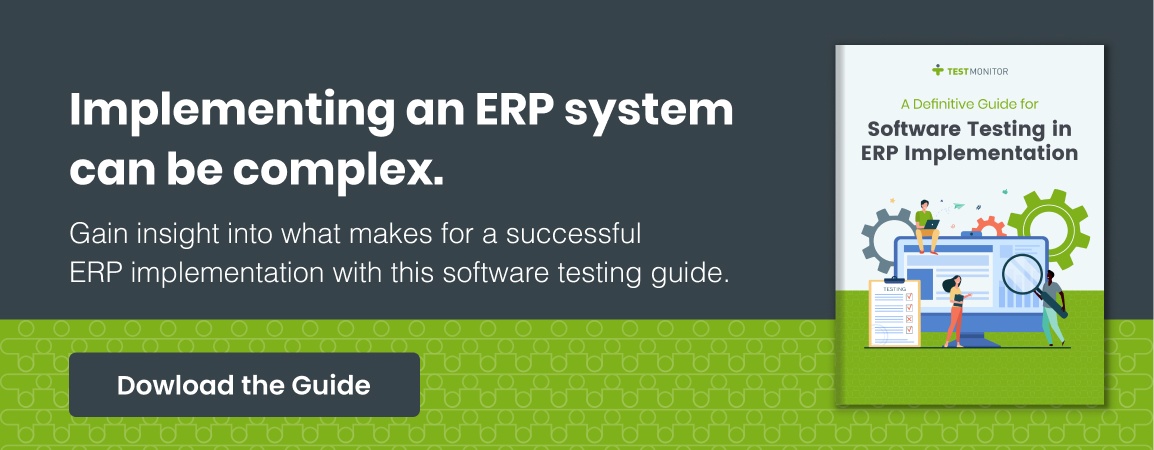The Beginner's Guide to ERP Testing
Summary: The article emphasizes the importance of ERP (Enterprise Resource Planning) testing, explaining the financial investments involved, the crucial role of testing in ensuring the system meets requirements, and outlining various types of ERP testing.
According to analyst firm Gartner, the number of enterprise resource planning (ERP) implementation projects that fail to meet their initial objectives is approximately 75 percent.
Will your ERP implementation add to this staggering statistic? Or will it buck the trend?
Whether your project is in its nascent stages or already a few months in, comprises an upgrade or a new implementation, or is planned to be a phased rollout or a big-bang, ERP implementations represent a big investment in your organization’s time, money, and resources.
Therefore, it is obvious that your implementation team and your project sponsors must do everything possible to ensure that your ERP system can deliver on its promises to your end users.
One of the primary ways to make sure that happens is by understanding the role and necessary components of successful ERP testing.
Here’s why:
Why ERP Testing Is so Important
According to one 2019 study, the average mid-sized company spends about $7,200 per user on an ERP implementation, which can add up to anywhere from $150,000 to upwards of $750,000.
With that much money invested in the initiative, it is important to confirm that, once delivered, the ERP system will meet the technical, functional, and business requirements it was scoped to include.
One of the best ways to ensure the system meets its specifications and, more importantly, earns the buy-in of the end users is through the ERP testing process itself. Not only does this allow you to confirm the ERP system is performing as expected, but it also involves the input of stakeholders to build vital buy-in for the implementation.
Each Form of ERP Testing Is Equally Important
Most ERP systems touch nearly every aspect of a business’s operations, including human resources, finance, and payroll. These systems can even play a key role in supporting security controls and compliance.
Given these many roles and functions, ERP testing encompasses a range of focus areas with specific tests performed at various stages of the implementation project. These tests can include:
- Functional Testing: Software testing that examines what the software is supposed to do. These test cases are designed from functional requirements, and developers and end users validate if the requirements are met (user acceptance testing).
- Integration Testing: This testing evaluates the ability of the ERP system to connect to the necessary data, properly pass and receive it, and perform its functions or facilitate other systems’ functions. These tests also confirm the integrity of the data passed.
- Performance Testing: To ensure that the software can handle the expected processing loads without a degradation of performance or even failure, it's important to use performance testing. This testing also determines the maximum computing loads the system can manage in periods of high use or high demand.
- Security Testing: These tests evaluate security controls and determine potential vulnerabilities to help to minimize the risk of a data breach or security incident, and help users understand the data ERP solutions process, such as sensitive employee and financial data.
- Regression Testing: When an ERP is launched in a phased implementation or has post-production patches and upgrades, these tests ensure that the new components do not negatively impact the functionality of the existing production elements.
How a Test Management System Can Enhance Overall ERP Testing
With a variety of testing types, potentially hundreds of functional and business requirements, and dozens of stakeholders and end users, utilizing an industry-leading test management system like TestMonitor makes each step of the ERP testing process simpler.
From enabling testing managers to quickly set up, launch, and track the results of test runs, to providing testers with a seamless mechanism to track their work and input, test management systems drastically reduce the administrative burden of testing and rapidly consolidate feedback. This is particularly important when it comes to issue and task management, where you can use TestMonitor to manage, track, and prioritize feature requests, bug reports, and other project management tasks all in one tool. Being able to keep all relevant notes and discussions in one place means your team will always have the right information and context at their fingertips as they identify the best solution.
Testers can also utilize the intuitive interface to track each test case from start to resolution, and include attachments, screenshots, notes, and more in their results. In other words, the more opportunities that end users and stakeholders get to interact with and test the system, the more they will feel part of the ERP implementation process and go on to champion for the success of the overall project.
Give Your Organization an ERP Testing Advantage
Although ERP testing can seem daunting, project managers now have a range of tools to help them with this critical phase of ERP implementation.
TestMonitor offers a proven way to simplify and improve your organization's ability to plan, execute, and track testing efforts from beginning to end, right out of the box.
Interested in learning more and seeing its powerful features for yourself? Contact us now and we will set your organization up with its own 14-day free trial.







